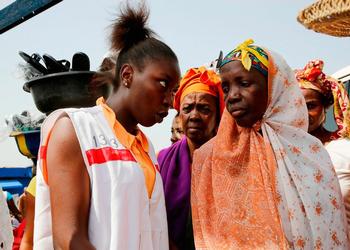
CONAKRY, Guinea, March 26, 2015 (ENS) – One year after the current outbreak of the Ebola virus in West Africa that has claimed more than 10,000 lives, the Guinean government with the World Health Organization this week began the first trial of an Ebola vaccine in an affected community. The vaccinations are taking place in the Basse-Guinée, one of the areas where most Ebola cases are found in the country.
The proposal to conduct ring vaccination tests of VSV-EBOV, an Ebola vaccine developed by the Public Health Agency of Canada, received an excellent response from the community in a small village in the Coyah prefecture, where the trial team arrived on Monday.

The ring vaccination strategy consists in identifying recently infected patients and vaccinating all their contacts, thereby creating a ‘ring of immunity’ around them to stop the virus from spreading.
Vaccination of some 10,000 people in 190 rings is planned within a six to eight week period. Volunteers will be followed for three months. Results could be available as early as July 2015.
“This landmark operation gives hope to all of us, in Guinea and in the world, that we might soon have an effective public health tool against Ebola, should the vaccine prove to be safe and effective,” said the WHO Representative in Guinea, Dr. Jean-Marie Dangou.
“The start of ring vaccination clinical testing today in Guinea is therefore one of the most important milestones we have achieved in seeking a modern line of defense against Ebola,” said Dr. Dangou.
Trained medical staff, vaccines and other essential equipment were dispatched from Conakry to Coyah to vaccinate contacts of recently infected people who have given consent in a village of the Coyah prefecture. Vaccinations for now will include only adults, who are most at risk of infection, with the exception of pregnant women.
“We are committed to ending this epidemic,” said Dr. Sakoba Keita, National Coordinator of the Fight against Ebola in Guinea. “Combined with control measures that we are putting in place with our partners, a safe and effective vaccine will allow us to close this trying chapter and start rebuilding our country.”
“This very same strategy was a key contribution to eradicating smallpox in the 1970’s, and allows us to vaccinate all those at greatest risk,” explained WHO Coordinator for the Guinea Vaccine Trial, Dr. Ana Maria Henao Restrepo.

Dr. Bertrand Draguez, Medical Director for the Non-governmental Organization Médecins sans Frontières (MSF) stressed that: “The trial is organized on a voluntary basis, and participation is confidential, free and non-remunerated.”
The Guinean Government is fully committed to the success of the vaccine clinical trial. In a March 20 official letter addressed to all the mayors, prefects and local health officials in Guinea, the head of the National Coordination Against Ebola in Guinea, Dr Sakoba Keita, asked everyone for their full cooperation and support.
VSV-EBOV Vaccine was developed by the Public Health Agency of Canada. The vaccine was licensed to NewLink Genetics, and on November 24, 2014, NewLink Genetics and Merck announced their collaboration on the vaccine.
The ring vaccination trial design was developed by an international group of experts from Canada, France, Guinea, Norway, Switzerland, United Kingdom, United States, and WHO.
This group included Professor Donald A. Henderson, who led the WHO smallpox eradication effort.
For the first time in West Africa, a case of Ebola was confirmed on March 21, 2014, three weeks after the first alert of a possible viral hemorrhagic fever emerged from Guinea’s Forest region. Rainforest animals such as fruit bats, rodents and monkeys are believed to have served as reservoir for the virus.
The Guinea Ebola vaccine trial is a coordinated effort among numerous international partners.
The World Health Organization is the sponsor of the study. The Government of Guinea, Doctors without Borders / Medecins sans Frontières, Epicentre, the Norwegian Institute of Public Health and WHO are coordinating its implementation.
The trial is funded by Doctors without Borders; the Research Council of Norway through the Norwegian Institute of Public Health; the Canadian government through the Public Health Agency of Canada, Canadian Institutes of Health Research, International Development Research Centre and Department of Foreign Affairs, Trade and Development; and WHO, with support from the Wellcome Trust, United Kingdom.
Copyright Environment News Service (ENS) 2015. All rights reserved.
© 2015, Environment News Service. All rights reserved. Content may be quoted only with proper attribution and a direct link to the original article. Full reproduction is prohibited.
